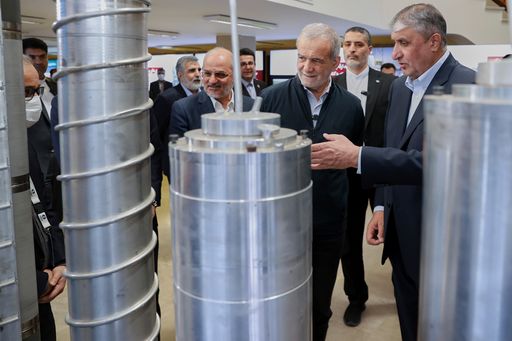Washington, DC — Despite holding five rounds of talks since April to thrash out a new nuclear deal to replace the 2015 nuclear accord that Donald Trump abandoned in 2018, negotiations between Iran and the US appear to have hit a bottleneck, in what experts say marks the beginning of a "complex and contentious process."
"That the US and Iran are engaged in direct or indirect negotiations is a promising development, but it marks only the beginning of what could become a complex and contentious process," Mohsen Milani, a Professor of Politics at the University of South Florida, tells TRT World.
Milani, who is also the author of the recently released book Iran's Rise and Rivalry with the US in the Middle East, says the ongoing negotiations reflect the "determination" of both sides to find a peaceful resolution and avoid military confrontation.
Negotiations have so far occurred in Oman and Italy, with both parties indicating advancements towards a potential agreement.
However, things began to unravel after Steve Witkoff — US President Trump's special envoy to Iran — reportedly sent a proposal to Tehran.
The plan proposed Iran could keep low uranium enrichment for civilian uses if it closed its protected underground sites for a set time.
Oman presented Iran with the US proposal for a new nuclear deal on Saturday, having mediated talks between Iranian Foreign Minister Abbas Araqchi and Witkoff.
Axios, which first reported on Witkoff's proposal, stated that under the plan, Iran would not be allowed to construct any new enrichment facilities and must "dismantle critical infrastructure for the conversion and processing of uranium."
Axios reported the offer also proposed a regional enrichment consortium, subject to conditions.
According to sources quoted by Axios, the US proposal would also prohibit Iran from constructing new enrichment sites and mandate the dismantling of essential uranium processing infrastructure.

Trump, Khamenei differ on enrichment
However, Trump appeared to undermine the proposal reportedly offered by Witkoff, stating that he would insist Tehran fully dismantle its nuclear enrichment programme as part of any deal to ease the sanctions.
Iran's supreme leader Ali Khamenei hit back on Wednesday, arguing that the US proposal was against the national interest.
"The (nuclear) proposal presented by the Americans is 100 percent against" the ideals of the 1979 Islamic revolution, Khamenei said in a televised speech. "Independence means not waiting for the green light from America and the likes of America."
Khamenei said enrichment is "key" to Iran's nuclear programme and that the United States "cannot have a say" on the issue.
"If we have 100 nuclear power plants but don't have enrichment, they will be of no use to us," because "nuclear power plants need fuel" to operate, he said. "If we cannot produce this fuel domestically, we have to reach out to the United States, which may have dozens of conditions."
"The sensitive issue of uranium enrichment on Iranian soil is a major obstacle," says Milani, adding Khamenei directly connected Iran's entitlement to enrich uranium with its sovereignty and independence.
"This was a direct rebuttal to Washington's maximalist demand for zero enrichment inside Iran — a demand the US had explicitly abandoned when it signed the JCPOA in 2015.
"The ball is now in Washington's court."
Amidst the talks, the US has unveiled new sanctions targeting Iran, even as Israel has threatened to attack Iranian nuclear sites if talks collapse.
Will Tehran capitulate to these tactics?
"It is hard to imagine Iran capitulating to maximalist demands to halt its enrichment activities. Even if — and this is a big if — Iran agrees to the idea of forming an enrichment consortium, Tehran is unlikely to abandon its indigenous enrichment activities. At this stage, both sides appear to be testing each other’s red lines and are sending out trial balloons," says Milani.
Tehran has long believed —and continues to believe — that Israel alone cannot destroy Iran's nuclear facilities, which are dispersed throughout the country's vast territory, he says.
"From Iran's perspective, any military strike on its nuclear infrastructure would be a joint Israeli American operation, with Israel taking the offensive role and the US managing the defensive dimension."

US says Iran must accept proposal
Currently, Iran enriches uranium to 60 percent, exceeding the 2015 deal's 3.67 percent limit, but remains below the 90 percent needed for a nuclear warhead.
A UN report indicates Iran has increased its stockpile of uranium enriched to near weapons-grade levels since February.
Western governments accuse Iran of pursuing nuclear weapons. Iran maintains its programme is solely for peaceful purposes.
In 2015, Iran received international sanctions relief, contingent upon UN-monitored constraints on its nuclear activities.
In 2018, Trump reinstated US sanctions upon exiting the agreement, subsequently reinforcing them with secondary sanctions. And, Britain, France, and Germany are considering whether to trigger the sanctions "snapback" in the 2015 accord.
Prior to the sixth round of discussions, the US has encouraged Iran to consider Witkoff's recent proposal.
"We encourage the Iran regime to accept it. It is in their best interest to accept it. We've also been clear that the Iranian regime can never have a nuclear weapon," State Department Deputy Spokesperson Tommy Pigott told reporters on Thursday in Washington, DC.
"We expect to meet with the Iranians again soon."















